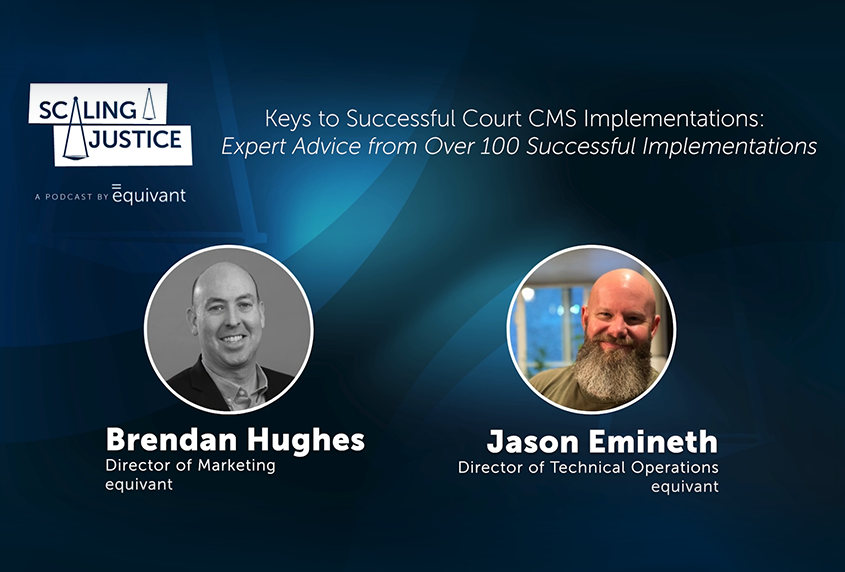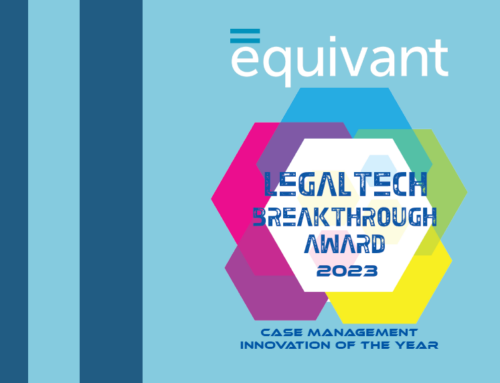Keys to Successful Court CMS Implementations: Expert Advice from Over 100 Successful Implementations
Scaling Justice • An equivant podcast

The importance of a Court Case Management System (CMS) can’t be understated. It’s the backbone of a highly functional, well-run court that effectively serves its community. But without successful implementation, you might not get the most out of your CMS.
In this episode, equivant Director of JWorks Technical Operations Jason Emineth shares how to successfully roll out your new CMS. Hear the important things courts can do to prepare for a new CMS, how to address the amount of time and resources needed, what makes some projects go smoothly, and others fail, and the key questions to ask when selecting a vendor.
Watch now:
Tune in:
Scaling Justice Podcast Transcript
Keys to Successful Court CMS Implementations: Expert Advice from Over 100 Successful Implementations
Brendan Hughes: Hello and welcome to Scaling Justice, a video podcast by equivant that operates at the forefront of the justice space. I’m Brendan Hughes, Director of Marketing at equivant. All of us here at equivant are dedicated to delivering innovative solutions to simplify justice, to help build more efficient and effective justice agencies nationwide.
Today, our topic centers on how to ensure the successful implementation of a new case management system, often referred to as a CMS at a court or justice agency. Now, as you can imagine, the implementation of a new CMS is a huge task and a large project for any organization. The importance of the court CMS can’t be understated, even with a trusted, competent vendor who will guide you through the process, there are several things courts and agencies can do to prepare in advance to make sure they are ready.
A few simple things can ease their mind and ensure the implementation has the best chance for success. Today, we are lucky to be joined by Jason Emineth, who’s been part of more than a hundred successful implementations, and he’s seen everything. He’s been on both sides of the implementation projects. A former leader at the Montana Department of Justice as Support Systems Bureau Chief, and now as a Director of Technical Ops at equivant. He’s been part of all types and sizes of implementation projects.
Most importantly, he knows what makes these projects go well. And on the other side, Jason has seen firsthand the errors and mistakes that can derail projects. So welcome, Jason. I know I’ve given you a brief intro and some background, but could you provide a little bit more detail?
Jason Emineth: You bet, Brendan, thanks for having me here today. I’ve got just over 23 years of experience implementing information technology and software solutions in the justice domain, working in both the public and private sectors like you mentioned, implementing critical integrated enterprise information systems, managing services delivery and directing software product development. With equivant, I currently direct R&D for our latest case management system product, and prior to that I led the R&D and implementation activities for equivant’s integration team.
As you mentioned, in a past life I worked for the Montana Department of Justice as their support services bureau chief leading the operational and technical staff responsible for the planning, procurement, implementation operational support of the DOJ systems and networks. Supporting customers including local, state, regional, and federal law enforcement in criminal justice and non-criminal justice partner agencies, including 24/7/365 critical justice information services and management of the department’s critical projects.
Brendan Hughes: Great, great. Well, that’s an extensive background and as I kind of laid out in the intro, I’m sure you’ve seen it all during those more than a hundred implementations. So Jason, let’s dive right in. What’s the most important thing in your mind that a court can do to prepare for a project or implementation? I’m sure vendor will have a plan and lead the project, but are there key steps courts can do to ensure success?
Jason Emineth: Yes, in my mind, it’s critical that the court have both a vision and a mission accompanied by a well-defined set of goals and objectives to inform their strategy and planning. This is really important as a starting point to ensure the alignment of all the court’s stakeholders and that the entire organization supports the vision, mission, and objectives so that they can develop and execute their related strategies and plans to meet the court’s objectives.
Brendan Hughes: No, that sounds like a very good starting point for people and I know what you were just outlining there. You can take a lot of time and resources up. From your experience, what can courts do to address that part of the process, the amount of time and resources needed?
Jason Emineth: One of the most important things the court can do is appoint a champion for their implementation project. Typically, this point person would be a dedicated project manager. They’re responsible to the court stakeholders and work closely with them and the court staff to plan and manage the project through to completion. As such, trying to utilize an existing court staff member with other job responsibilities for this role will result in one likely both of those roles and the related duties responsibilities suffering to the detriment of the project which nobody wants.
Additionally, the court staff will need to be engaged in the project as subject matter experts the requirements gathering and business process reviews to validate data during the conversion and to learn, train and test the new system all while doing their normal jobs. As part of that, the court should be very realistic about their resource capacity when developing their project implementation plan and be as conservative as possible for an implementation project in that process.
It’s very easy to underestimate the court staff effort and time required in an implementation project. Experienced project managers on both the court and the vendor teams can help ensure that the court develops a realistic plan with the best chance of success.
Brendan Hughes: That makes a lot of sense. I know from just in other projects outside of implementation that a lot of times people have the idea that everything’s going to go smoothly. They think things will be done in a few days, and oftentimes that realistic timeframe doesn’t come into play and then they get caught and then everything gets delayed and expectations are drowned out. So it makes a great point there, Jason.
Maybe even diving in a little bit more on that, what are some specific items that probably will pop up as far as those times and resources that take up more time to be more realistic? What should courts do to be a little bit more aware of that?
Jason Emineth: I referenced a few. There are several critical path activities that the court should understand in terms of their own resource commitment to the project requirements gathering for any customizations. Here, the court will need to provide subject matter experts to help gather, define, review, and approve the requirements for any custom development. This is critical to ensure any customizations meet the court’s requirements. Business process review very similar to the requirements gathering activities.
The court’s subject matter experts will need to help define the court’s specific business processes and workflows. This will help to drive the configuration, data conversion, training and testing phases of the project implementation, and I referenced data conversion during that phase of the project. It’s critical project activity, data conversion validation. The court’s IT staff engages to provide any required source data mapping while their subject matter experts assist in validating the converted data.
This is an iterative process throughout the project, impacting nearly every other activity and all important to go live. Finally, user acceptance testing. The core subject matter experts will develop a test plan and complete testing of any customization configuration as well as the general system implementation, ensuring the system works the way the court needs it to.
Brendan Hughes: No, those are really good points there. As you said, there’s a lot that can go on and these implementations a lot of time and resources and identifying a few of those key ones to really be aware of at the start. Those are great points. Driving back to your extensive background, Jason, I’m sure there’s some projects that you’ve been a part of that come to mind that really went well, sometimes that went exceedingly well.
And so what were some of the things you learned from those projects or are there any examples that stick out to you as things that court should be aware of? What went well and why?
Jason Emineth: As a matter of fact, a very recent court CMS implementation was just about the smoothest go live we’ve ever been involved with. The project and the go live, the success was really a combination of two things. One, the court’s engagement in the process and their commitment of resources. And two, our team’s diligence and execution of the project plan along with the court in that activity. It was a real partnership and a great example of how to implement a CMS.
There were some issues, there always are, but we were able to address those and stay on track by focusing on executing for the plan. That happened because the court was committed to the plan and the collaboration between the teams made that easy.
Brendan Hughes: Great. That’s awesome. What made me think of something as you were talking about is how well that went. I’m also sure that over your years of experience, there’s been one or two maybe that didn’t go so well. And there’s probably lots of reasons that a project doesn’t go as expected and things can derail it all the time, but is there anything that comes to mind or example that didn’t go well and there was a really good learning from it or something you guys learned because of the project not going as well as expected?
Jason Emineth: Unfortunately, some implementations are challenging and some even fail. An example of a challenging implementation includes one where the court didn’t have a dedicated project champion or project manager, and the person that they did have in place didn’t have a good rapport with the executive stakeholders. As a result, the court from top to bottom struggled with both the business process review and user acceptance testing areas not only being unable to provide the required resources, but being able to focus on the critical path items necessary to stay on track.
Essentially, the plan just kind of fell apart, and this is really where a dedicated project manager or a champion shines. They can help to maintain or refocus the court’s staff and to keep the court team, including all the stakeholders aligned. That communication between the subject matter experts and the people running the court day-to-day and the court stakeholders and then collaborating, communicating with the CMS vendor team is just crucial.
Helps the entire team stay committed to execute on the project plan or if necessary, rework it. And unfortunately, that just wasn’t the case here and the project implementation suffered because of it.
Brendan Hughes: No, that makes sense and it’s unfortunate at the time, probably very unfortunate when you have those things. But as they often say, some of your best and learning outcomes come from things that are kind of failures, and so that’s a great point of why that didn’t work out and how you can avoid that in the future.
One of the things that has really stuck with me listening to you talk here and then in our past experience is knowing that the CMS software is generally the same, but each court is a little bit different and they have their own processes and each court has their slightly different ways of doing things. So matching to that, how important is it for the court to have power users involved or SMEs involved in the process as well as during the implementation?
Jason Emineth: That’s a great question. As I referenced earlier, the court subject matter experts, they’re really one of the most important ingredients to the success of the project, especially for critical path activities like requirements gathering, business process review and configuration. Explaining the court’s workflow for configuration and requirements and validation and for data conversion, validating the converted data, and then in the user acceptance testing.
Again, ensuring the system works the way the court needs it to. It really can’t underestimate the importance of the court’s subject matter experts in the success in terms of planning and executing the project.
Brendan Hughes: Great. That makes a lot of sense. And we referenced this also at the beginning during this project, there’s two parts to it. There’s the court side and there’s a vendor obviously, and they will be doing a lot of the heavy lifting. They will lead the project and you want an experience vendor obviously, but what are some other things, some key things or questions you should ask before selecting a vendor? Anything that you should be aware of when going through that process?
Jason Emineth: As you mentioned, obviously the court will look to partner with a vendor that has demonstrated success and implementation. And like I said before, every CMS vendor has had successful, challenging and even failed implementations. However, the court can ask some key questions to vet a vendor that will help them choose the right partner for their project. One of those is for specific examples regarding one successful implementations and two challenging or failed implementations, kind of like the previous question that I answered.
The other question the court can ask is how the vendor plans to lead the implementation project and what they will do and recommend given different scenarios or issues, especially those that might impact the project budget or schedule. That can give the court a real sense of how the vendor does business and what they bring to the table in terms of capability, experience, and overall qualifications. But maybe more importantly, the court can get invaluable insight into the culture, commitment, integrity, and transparency that the vendor brings to every customer engagement.
In my mind, this is crucial because it’s building trust, which is obviously the foundation of any successful partnership or endeavor, but especially so for something as complex and level of effort intensive as a court CMS implementation project. If a court can’t check both of those boxes with a vendor, that should give them real cause to reconsider a partnership. In other words, the court really needs to be able to ask hard questions and be willing to get honest answers if they want to select a vendor that will truly partner with them, work collaboratively to the mutual success of both come what may.
Brendan Hughes: No, those are great tips for people looking at vendors and what they should ask, and I really like that last takeaway about hard questions, real answers, the trust and being able to be honest. And it probably goes a little bit back to that idea of being realistic about timelines and things like that. Those are great insights to what people should ask of their vendors. In addition to that, you’ve given some other really good things to think about for our court planning an implementation.
If there was one or two big takeaways you’d want listeners to have about making sure a court CMS implementation goes well, what is that?
Jason Emineth: Court CMS implementations are daunting, period. They’re complex and they require a significant investment of resources including money, people, and time. Consequently, they carry no small amount of risk. The court needs a real partner in the form of a CMS vendor to help lead them through any implementation, a partner that’s committed to the court’s vision, mission, goals, and their success.
If the court’s stakeholders can align on that vision, mission, and goals for the CMS implementation, commit to the investment of the required resources and partner with a CMS vendor that they can really trust and collaborate with. They will be able to successfully plan and complete a CMS implementation.
Brendan Hughes: Great. Those are great thoughts there. Again, it’s a big project. It does feel daunting at the outset, but I think Jason, you outlined a number of things here today that could give people a little bit of peace of mind if they are thinking about this in advance before the project. And gives them a little bit of a roadmap to go on to make sure that the end goal is successful. So again, thank you Jason today for all your time.
Great stuff, and thank you to the listeners. For everybody listening to this edition of Scaling Justice brought to you by equivant. Contact us at info@equivant.com to weigh in on this episode or let us know any topics you’d like to hear about in the future. Until next time, I’m Brendan Hughes and this has been Scaling Justice.





